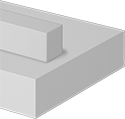Easy-to-Machine Aluminum-Nitride Ceramic Sheets and Bars

- Color: Beige
- Max. Temperature: 3,400° F
- Fabrication: Hot Rolled, Sintered
- Electrical Properties: Electrical Insulating
- Dielectric Strength: 1,650 V/mil
- Porosity: 0%
- Compressive Strength: 140,000 psi
Drill and mill precisely shaped heat sinks and other electronic components that require thermal stability. Aluminum nitride is known for both drawing heat away from hot spots and blocking electrical currents. This blend—also known as Shapal Hi-M—includes boron nitride, making these sheets easier to machine than standard aluminum nitride. While the addition of boron nitride slightly decreases its heat transfer and electrical insulating properties, these sheets still perform better than other ceramics.
As aluminum nitride heats up and cools down, it won't expand or contract, keeping its size and shape stable. It won't corrode from molten metal, so you can braze or solder this material to metal. Use it near lithium batteries and other chlorides without it corroding.
Easy-to-Machine Aluminum-Nitride Ceramic Rods

- Color: Beige
- Max. Temperature: 3,400° F
- Fabrication: Hot Rolled, Sintered
- Electrical Properties: Electrical Insulating
- Dielectric Strength: 1,650 V/mil
- Porosity: 0%
- Compressive Strength: 140,000 psi
Turn and drill intricate components such as heat sinks, fixture parts, and other electronics parts where thermal stability is important. Aluminum nitride both draws heat away from hot spots and block electrical currents. Also known as Shapal Hi-M, this blend includes boron nitride, so these rods are easier to machine than standard aluminum nitride. The addition of boron nitride slightly decreases heat transfer and electrical insulating properties; but this material still performs better than other ceramics.
Aluminum nitride won’t expand or contract as it heats up and cools down—its size and shape remains stable. Braze or solder this material to metal—it won't corrode from molten metal. You can use this material near lithium batteries and other chlorides without it corroding.

























